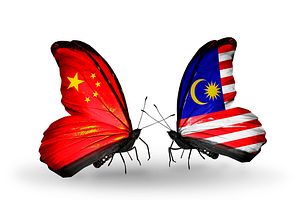Xi Jinping visited Malaysia in December 2013. At the time, Xinhua was upbeat about China-Malaysia relations, proclaiming that “Xi’s visit ushered in a new era in Sino-Malaysian ties.” The article added, “As China and Malaysia celebrating the 40th anniversary of formal ties in 2014, great opportunities await.” Now, however, those “great opportunities” have been overshadowed by an unexpected crisis: the disappearance on Malaysia Airlines Flight 370, along with 239 passengers and crew (including over 150 Chinese passengers).
Since the disappearance of the flight on March 8, China’s government has grown increasingly restless regarding Malaysia’s response. The slow trickle of information from Malaysia was outpaced by media reports and speculation, causing consternation among Chinese officials hoping to be kept informed of the latest developments. For example, according to Hong Lei’s press conference on March 14, China first heard of Malaysia’s suspicion that Flight 370 had changed direction (meaning the search was taking place in the wrong area) by watching Malaysian Defense Minister Hishammuddin Hussein’s public press conference. Only afterwards, when China immediately requested clarification through diplomatic channels, did Malaysia officially confirm the information to Chinese officials involved in the search. The Chinese government is understandably fed up with relying on media leaks and public press conference for information.
Frustrations with the way Malaysia has handled the search are more and more evident with each new statement from China’s government. The anger has been even more apparent in China’s state-run media outlets. Xinhua denounced the silence of officials, bemoaning the fact that “Chinese and Vietnamese vessels … combed the [South China] sea area again and again, while some already knew for sure that search and rescue missions would be in vain.” The article concluded that “withholding information from the public can be dangerous, even lethal. Silence, sometimes, can kill.”
The public falling out between Kuala Lumpur and Beijing could have lasting implications for regional diplomacy. Malaysia and China have had a special relationship for years, ever since 1974, when Malaysia became the first of the ASEAN countries to establish diplomatic ties with China. Malaysia is also China’s largest trading partner among ASEAN, with bilateral trade worth $106 billion in 2013. In fact, Malaysia is China’s third largest trading partner in Asia, behind only Japan and South Korea. The country is a popular destination for Chinese tourists, although it’s likely the disappearance of Flight 370 will put a damper on the tourism trade.
Notably, the friendly relationship between China and Malaysia has remained mostly untouched by disputing territorial claims. Unlike the Philippines and Vietnam, Malaysia has refused to engage in public spats with China over disputed territory—even when, as was the case last January, the Chinese navy was reported to have held an oath-taking ceremony at the disputed James Shoal, just 80 kilometers from the Malaysian coast. At the time, Malaysia’s The Star newspaper noted that Kuala Lumpur prioritizes its diplomatic and economic ties with Beijing over staking a strong claim to territories in the South China Sea.
Now those efforts to maintain close ties to Beijing may be undone by the way Kuala Lumpur has handled the search for Flight 370. China News Service, citing a member of the Malaysia-China Chamber of Commerce, said that the controversy surrounding Flight 370 will negatively impact the relationship between Beijing and Kuala Lumpur. Should the relationship dim, China might shift its efforts to courting other ASEAN partners, leaving Malaysia out in the cold.

































